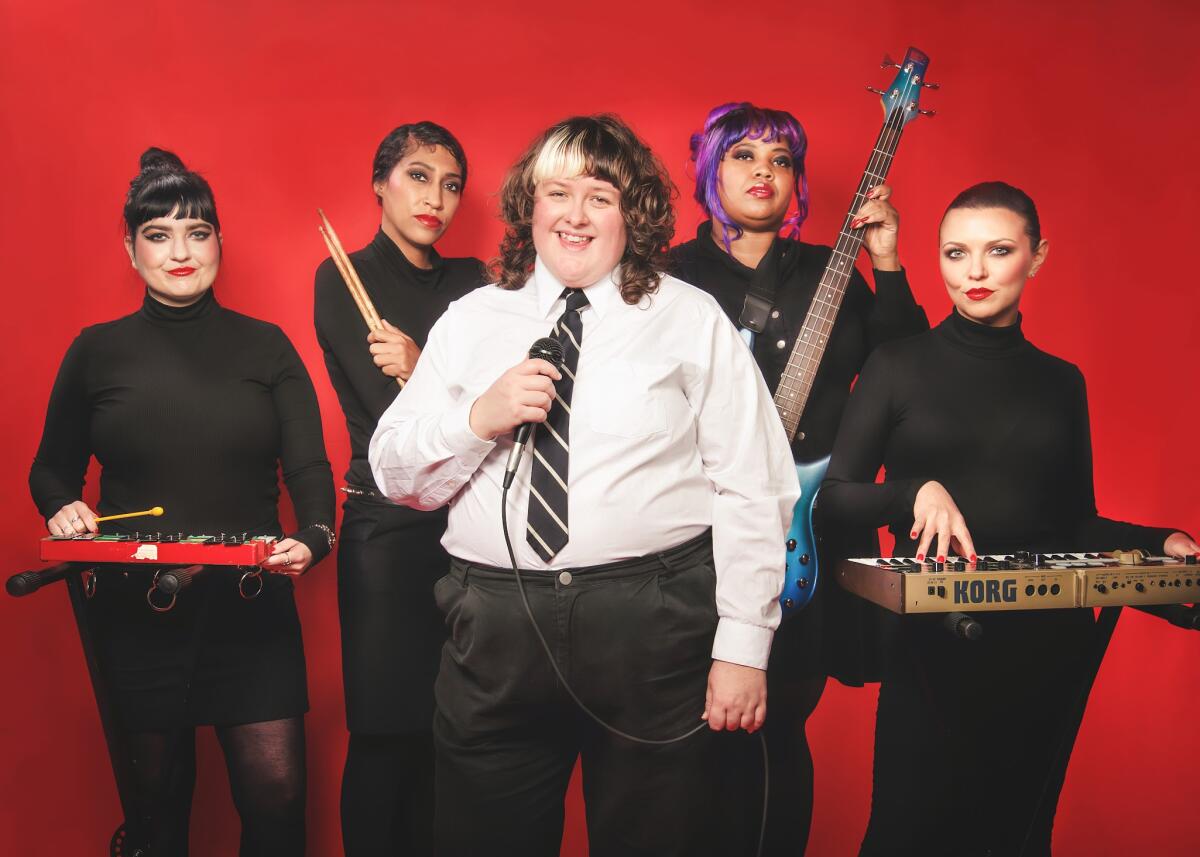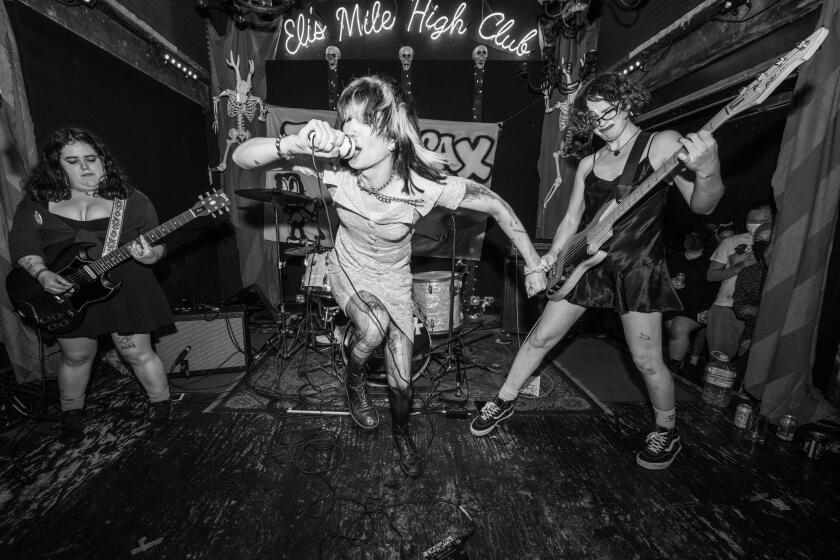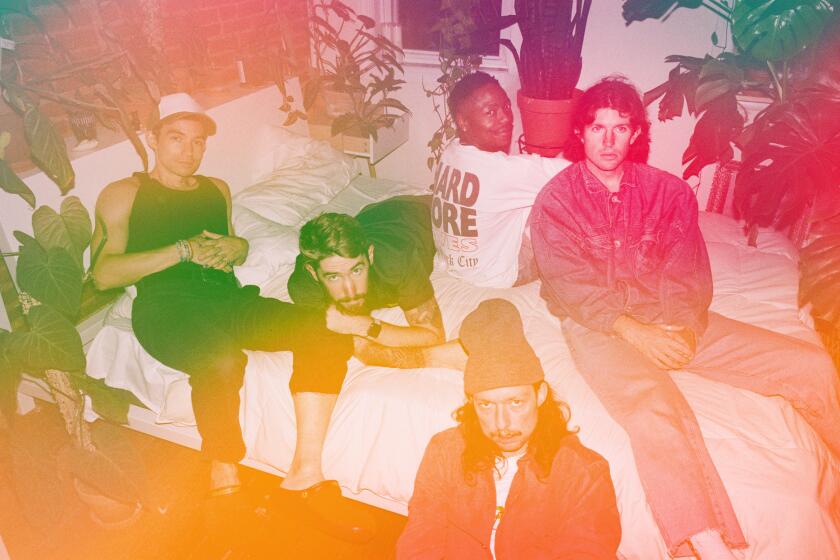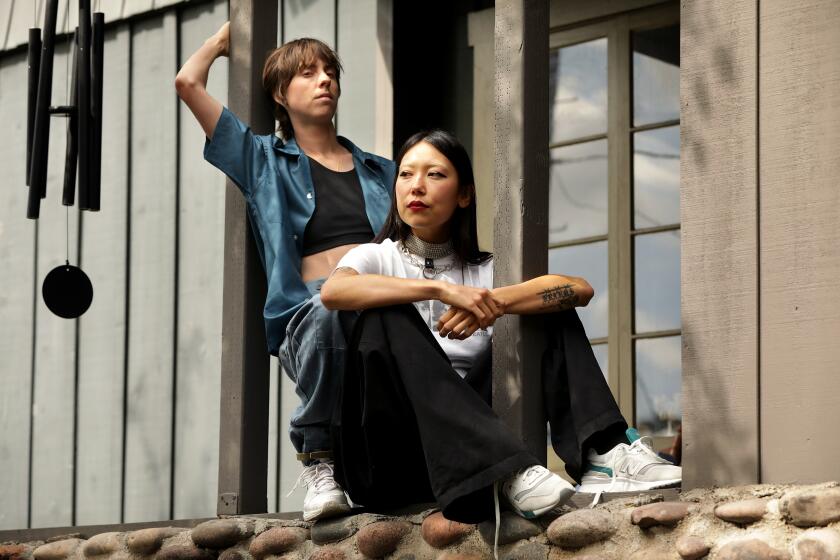Fatty Cakes and the Puff Pastries feasts on queer punk energy and plus-sized self-love

- Share via
“Feed us! Feed us!” a crowd chants in front of the stage as Fatty Cakes and the Puff Pastries prepares to kick off its set on a recent night at the Echo. Before the band plays a note, first things first — the fans must feast.
With open pizza boxes in hand, band members Victoria Crow and Staci McDowell present an enticing junk food offering to the punk rock revelers, tossing out triangular pieces of grease-soaked bliss like dollar bills at a strip club. It’s the perfect pre-show snack before vocalist and electric ukulele player Amber Fargano gets the party started.
“This song, children, is about a martyr in our church who burns daily for us, and we are now about to take the sacrament,” Fargano says during a recent L.A. punk show just as they introduce their song “Pizza Girlfriend.”
Feeding pizza to fans from the stage before opening a show for Alice Bag, Kathleen Hanna and Terri Gender Bender might sound like a feminist punk fantasy, but for Fatty Cakes and the Puff Pastries it’s one slice in a long history of living the DIY dream. On any given day you might find them going to gigs in Central Valley apple orchards or chasing off creeps in parking lots with a Hello Kitty baseball bat — all part of what it means to be self-proclaimed freaks from Fresno.
The band returns to Los Angeles on Friday night, playing a fundraiser for accessible youth puppet shows at Bob Baker Marionette Theater as part of their Addicted to Puffs West Coast Tour, a callback to their old days of touring Girls Rock Camps on the West Coast and a mission that aligns with their goal to empower audiences who feel stuck on the sidelines.
“Fatty Cakes and the Puff Pastries is such an amalgam of things,” says Fargano. The band’s influences are varied: The B-52s, the Pixies, Propaghandi, Gravy Train, Nine Inch Nails and Sleater-Kinney to name a few. Fargano started Fatty Cakes in 2011 as their solo project, intentionally choosing that name to create an opportunity for people to say the word “fat” in a positive context. This was inspired by fat liberation and body positivity discourses that aim to call out the toxicity of diet culture and remove the stigma from fatness.
In an effort to expand into something more whimsical and fun, Fargano invited bassist and vocalist Vishinna Turner, as well vocalists and synth/glockenspiel players Crow and McDowell to join as dancers who quickly became known as the Puff Pastries. Audrey Johnson, who at the time was playing drums for Fresno-based DIY darlings Needy Eevy, joined on drums. During the first few years the quintet molded its trademark sound and style, mixing bold and colorful looks and dance moves with upbeat groove-heavy indie anthems complemented by punky harmonies and bright and playful ukulele and glockenspiel riffs.
Fatty Cakes and the Puff Pastries gigs are scaffolded by rage, humor and joy, where crowds have come to shake their ass and scream their anxieties out on the dance floor — celebrating queer life while shouting down sexism, racism, fatphobia and homophobia.
Since its inception, the band has made a name for itself, sharing stages with acts like Shannon and the Clams, Virgie Tovar, Fea and Dynasty Handbag. Punk icon Alice Bag took a shine to the band, producing the group’s self-titled debut LP released in 2018 on Emotional Response Records, complete with album art by surrealist painter Kezia Harrell a.k.a. @SugaryGarbage.
The band’s hooky and anthemic songs directly address friends and haters alike, screaming adages like “f— you and your neo-Nazi friends,” or proclaiming power in their “fat girl tears.” Many of the group’s old songs were written to be played with an audience and required the crowd to become a part of the show. It makes sense that the band’s pre-pandemic catalog embodies so much liveness; they were constantly touring and gigging. Since 2020, the band has turned to a more emotional and introspective writing process.
For Fargano, Fatty Cakes and the Puff Pastries’ new music feels like complex and nuanced journal entries as opposed to screaming manifestos.
“At a time that I was struggling to survive I really put on this mask and wig to put myself into the character that is Fatty Cakes to try to breed hope for others, [hoping] I could find that hope for myself too,” Fargano says. “Things have changed so much. I’ve taken off the mask, and, now, I think I’m bringing my full self to the music.”
Though the band considers L.A. a primary stomping ground, Fresno will always be its true home — even if it isn’t always easy. “It’s hard to explain,” Crow says. “Being Chukchansi, one of the many tribes that are indigenous to the Central Valley, my love and pride for this city is generational and ancestral.” For her, Fresno life is a combination of deep roots, messy house parties, best friends and perseverance.
Johnson, an accomplished drummer who has toured and recorded internationally with artists like La Luz and Omar Rodriguez-Lopez, was told by multiple people that she’d never get to travel being a professional drummer in Fresno. McDowell, a makeup artist, rolls her eyes recounting all the times people have told her to move away. “What can we do in Fresno?” she asks, “Why can’t we have the things that we want here. Sure we have to create it, but there is a mentality that we can’t have anything here — and that’s not fair.”

Though the Central Valley exports a quarter of the food supply of the United States, and has a history of activism, it’s often derided as a cultural wasteland. Its locals are typically reduced to an unhinged punch line, an image that Fargano has reincorporated with pride and a sense of humor. “Fresno breeds a very special kind of person,” Fargano says. “Saying we’re from Fresno is both a bond — and a threat.”
Everyone in the band is invested in Fresno, which includes working with dedicated arts and activist community endeavors like the Bruise Violet Collective. Made up of members of Fatty Cakes and the Puff Pastries as well as local artists like Amber Williams, Janelle Bowen and Liz Cabrera, the collective supports, empowers and books BIPOC, queer people, women, nonbinary people and other artists of marginalized identities in Fresno.
The group has made zines and organized community gatherings and events featuring live music and interactive art installations, and recently worked with Fresno City College on a show called “Constellating Care Networks,” an exhibition and mapping project highlighting the history and presence of Fresno’s LGBTQ community.
“Representation matters,” says Turner. “[In high school] I felt so isolated because I was a fat Black punk goth, I was self-hating, trying to shrink myself to fit into a white supremacist mold,” she says. “It was really nice to go from standing in the back of the room and not really being a part of the pit... and now onto the stage while the pits are going. I never thought I’d make it to center stage.”
It is this feeling of possibility rooted in chosen family that resonates so deeply with so many fans who see themselves reflected in the members of the band.
“Fatty Cakes and the Puff Pastries is my fat revenge,” Fargano says, acknowledging past experiences of being passed over because of the music industry’s tendencies toward fatphobia, making it that much more rewarding and powerful to stand center stage. “Success doesn’t always mean you’re a multi-platinum Grammy winner with millions of dollars, it’s also expressing myself, traveling, and hearing that my story is like other people’s stories too.” Fatty Cakes and the Puff Pastries might not be nominated for a Grammy (yet), but, like Fargano says, “everyone’s always gunning for the underdog.”
More to Read
The biggest entertainment stories
Get our big stories about Hollywood, film, television, music, arts, culture and more right in your inbox as soon as they publish.
You may occasionally receive promotional content from the Los Angeles Times.













